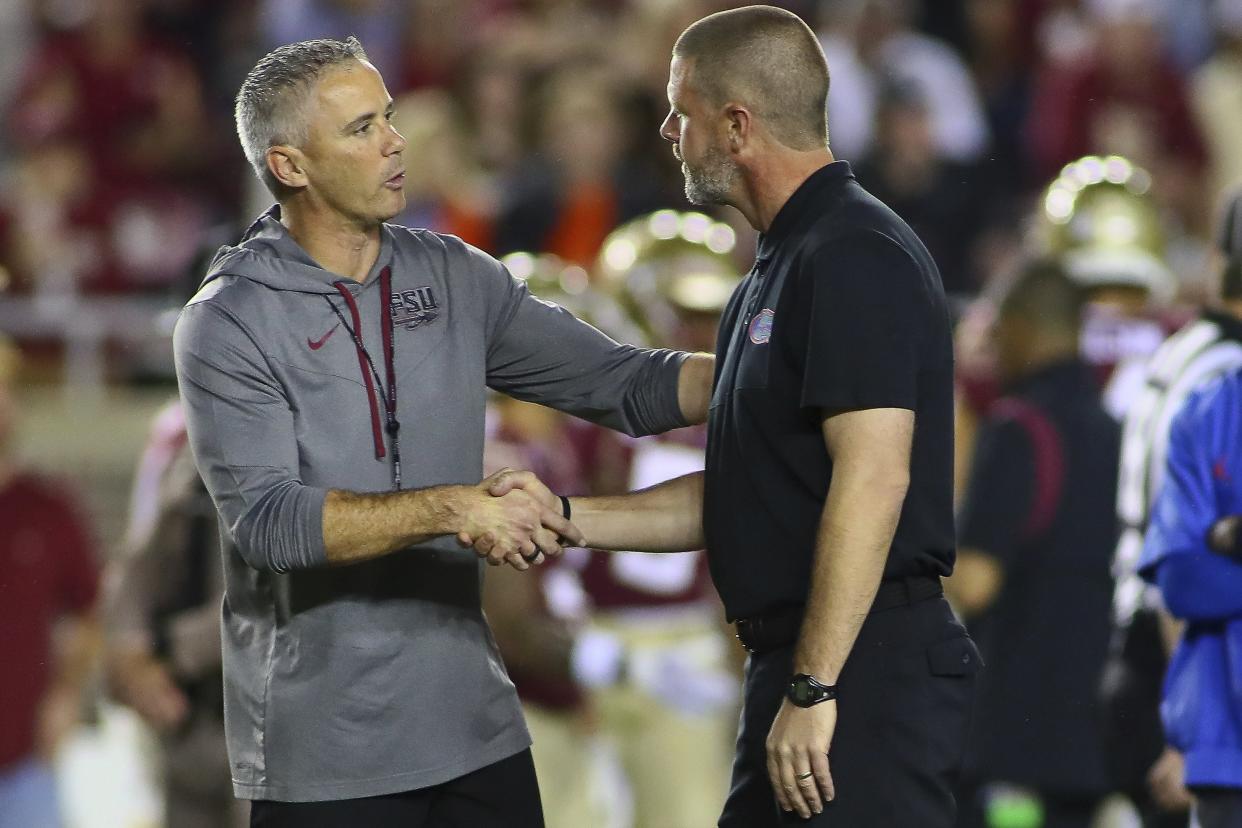Gene Frenette: CFP expansion means Florida, FSU, Miami, UCF coaches under gun to get there

- Oops!Something went wrong.Please try again later.
When the news came down last week that a 12-team College Football Playoff would be implemented starting with the 2024 season, coaches like Billy Napier (Florida), Mike Norvell (Florida State) and Mario Cristobal (Miami) were no doubt rejoicing.
By tripling the access to the prestigious CFP, it means coaches at high-resourced Power 5 programs across the country will have a much better opportunity to reach a coveted goal that would help them retain job security.
They should also remember this: an expanded playoff system is a double-edged sword.
Gene's previous 3 columns
Gene Frenette: Dreadful defense gives Jaguars no chance to beat Lions or retain playoff hope
Gene Frenette: Mario Cristobal has a ton of work ahead to fix underachieving Hurricanes
Gene Frenette: FSU has edge on Gators because Norvell rebuild is further along than Napier's
While the odds increase substantially for their teams to get into the playoffs, it also means the heat gets turned up on a ton of coaches in the SEC, ACC, Big Ten and elsewhere whenever two, three or four years pass without their program getting into a 12-team playoff.
It’s one thing to not get into the current 4-team CFP because the minimum requirement is either winning a tough conference or going at least 11-1 or 12-1. There’s a lot more margin for error when the only postseason that matters opens up six at-large spots.
A 12-team playoff will also include the highest-ranked Group of 5 champion, plus the next highest-ranked remaining champion outside of the top four champions getting a playoff bye.
Under the expanded system, teams with two and maybe three losses will be making the field. That means programs with coaches earning salaries in the $5-12 million neighborhood by 2024, supported by rabid fan bases, won’t be viewing a ReliaQuest Bowl appearance as a successful season.
“I just think the pressure mounts because every team in the SEC but Vanderbilt realistically thinks they should be in Atlanta [for the conference championship],” said TaxSlayer Gator Bowl president Greg McGarity, the former athletic director at Georgia (2010-20). “Remember, Missouri went twice. It amps up the pressure to have your team in that top-12 [CFP] ranking because being in the playoff will bring more attention than being in the Cotton Bowl or Sugar Bowl.”
Florida schools under the gun
When the 12-team CFP arrives, providing they don’t get fired or leave, Florida’s Napier and Miami’s Cristobal will be in their third season. Norvell would be in his fifth year at FSU.
That’s plenty of time for the coaches of the Big Three among the state’s Power 5 programs to expect their teams to become established league contenders. The same goes for UCF head coach Gus Malzahn, whose Knights join the Big 12 in 2023 and will be in his fourth season when his team begins competing in the 12-team CFP.
Had a 12-team playoff system been in place the past nine years, after the field expanded from two to four teams, that means 72 more available spots and 66 of them would have gone to Power 5 teams.
Based on schools who finished in the top 12 of the final CFP rankings from 2014-22, the SEC would have had 16 more teams in the playoff and the Big Ten 18 more teams that were ranked No. 5-12, followed by the Pac-12 (13), Big 12 (12) and ACC (7).
During that time period, based on the final CFP rankings, Florida (2018, ‘19) under Dan Mullen, FSU (2015, ‘16) under Jimbo Fisher and UCF (2017, ‘18) under Scott Frost and Josh Heupel would have made two playoff appearances in a 12-team format. Miami (2017) would have made one under Manny Diaz.
One can only imagine how much longer the tenures for those departed coaches might have lasted by taking their teams to a playoff instead of a Peach Bowl, Orange Bowl or Fiesta Bowl, though Frost would have likely gone to Nebraska and Heupel to Tennessee anyway.
In a 12-team CFP, the landscape changes considerably, as will how athletic directors and university presidents at many Power 5 schools view success for their football programs.
When asked how schools in the SEC and other Power 5 leagues might look at the tenure of a coach that missed the playoffs three consecutive years, McGarity replied: “That’d be pretty salty. You can figure out which fan bases would expect to be in the top 12 every year. You know the suspects.”

“Everybody ready for expansion”
College football is undergoing massive change with the advent of NIL, the transfer portal and the skyrocketing salaries of coaches.
It was only a matter of time before the money trail led to Power 5 conferences and administrators acquiescing to an expanded playoff system.
“The evolution is interesting to follow, but I think everybody was ready for expansion,” said Dave Hart, who served as athletic director at Tennessee (2011-17), Alabama (2008-11), Florida State (1995-2008) and East Carolina (1987-95). “Now as we get closer to the transition [to 12-team CFP], at what point is somebody going to scream for 16 or 24 teams?”
Realistically, there are probably about 25-30 Power 5 schools who will benefit the most from playoff expansion. Those will be programs that routinely contend in the SEC, Big Ten, Pac-12, Big 12 and ACC, plus other lower-echelon Power 5 teams that have an outlier year like Pitt (No. 12, 2021), Iowa State (No. 10, 2020), Indiana (No. 11, 2020), Colorado (No. 10, 2016), Mississippi State (No. 7, 2014) and Georgia Tech (No. 12, 2014).
Nobody may welcome a 12-team CFP more than Penn State, which has never made the playoffs, but would have made it five times (2022, ‘19, ‘18, ‘17, ‘16) if that system had existed the past decade. Who knows what three-time, top-12 qualifiers USC, Baylor, Ole Miss and Utah might have done had a 12-team playoff been in existence?
With no cap on the number of playoff teams from the same conference, the SEC and Big Ten – based on where schools were ranked since 2014 at the end of the regular season – are probably looking at two or three at-large teams and their conference champion making the 12-team CFP in most years.
It will be more the norm than a surprise to see the SEC send three or four teams to the playoffs among Alabama, Georgia, LSU, Florida, Tennessee and Texas A&M. Some years, it could also be Auburn, Ole Miss and South Carolina landing a bid.
With an expanded playoff field, it also changes the recruiting game because more coaches will be able to sell 4-star and 5-star prospects on the idea of playing for a national championship.
That was a long shot for middle-of-the-pack Power 5 programs for many years, but not anymore. An expanded playoff brings more teams into play.
“Coaches today are extraordinarily well compensated and that drives people to expect more,” Hart said. “The same thing will also be true as we go to 12 [playoff] teams. The access is greater, so the pressure goes up.”
For Napier, Norvell and Cristobal, they have the time and resources to become a perennial playoff team like their programs would have been in the 1980s, ‘90s and parts of the 2000s. With Big 12 entry on the horizon, UCF’s Malzahn will soon have a bigger hammer as well.
Power 5 schools with enormous budgets better take advantage of an expanded football playoff rather quickly. Or that double-edged sword of a 12-team CFP will become a reason coaches get cut loose.
gfrenette@jacksonville.com: (904) 359-4540
This article originally appeared on Florida Times-Union: College football coaches at Florida, FSU, Miami, UCF face CFP pressure

